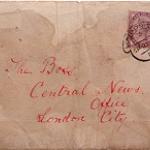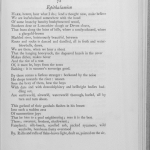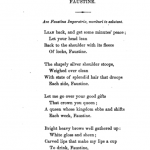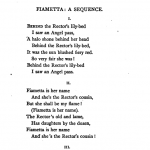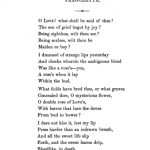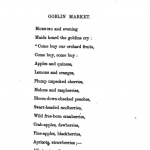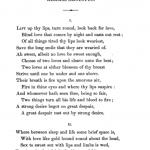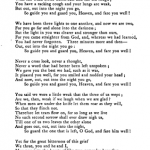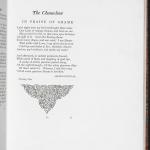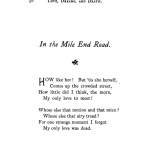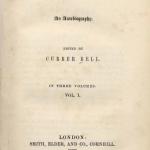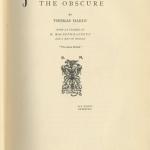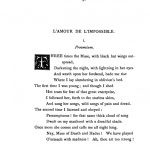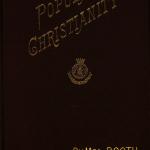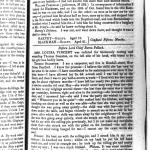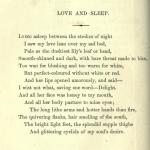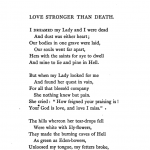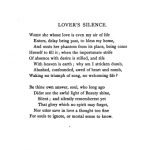All items
A letter written by a person claiming to be the serial killer that swept through London from 1888-1891. The letter is the first instance of the naming of the murderer, when he signs his name "Jack the Ripper."
Hopkins originally began this apparently-unfinished fragment about male beauty as an ode to his brother, on the occasion of his brother’s marriage in 1888. Hopkins may have written the poem while he was supervising a student exam at the Royal University of Ireland (Bridges 123-124).
Samuel Butler, a Victorian Era author and a closeted homosexual, wrote this poem in 1895 after the departure of his close friend (and possible lover), Hans Rudolf Faesch. However, Butler withdrew it from the public world because he was afraid that his poem, with its subtle homoerotic themes, would expose his sexuality. The poem was not published until after Butler's death by another close friend of his, Henry Festing Jones.
Lord Alfred Douglas published this poem in praise of queer desire in Oxford's undergraduate literary journal. It was later used as evidence against Oscar Wilde in the first criminal trial.
Amy Levy poem imagining a dead beloved walking through Victorian London's Jewish quarter.
Jude the Obscure is a novel previously begun and completed as a serial in Harper's New Monthly Magazine. It tells the story of Jude Fawley and his relationship with Sue Bridehead--his cousin and also his love interest. The romantic relationship of the two weave in and out of their separate marriages, divorces and remarriages with each of their other partners. Interestingly, even after they get together, the two spend some time together without any sexual relationship, in respect of Sue's preference. Eventually they do come to sleep together, but although they have two children, they never get married to each other at any point in the duration of their lives.
Thomas Hardy wrote and published the book after Tess of the d'Urbervilles, and in publishing it as a book after the serialization, made some edits to the manuscript to reflect the looser constrainsts of keeping it "decent" for the expectations of the magazine for which he had written it. Although after the book's critical reception he focused mostly on poetry, he did reprint the novel as a second edition after some revision, on 1912.
* The image features the title page of the first edition, and is followed by the postscript Thomas Hardy had added in the second edition in response to some of the criticism he had received in regards to marriage.
Popular Christianity is a compilation of sermons given by the esteemed Catherine Booth two years before her death in 1890. I could only find images of the text from the third edition, which was published in 1891. These passages are from her second lecture. Although Booth condemns desires that fall outside of Christian morality, her unusual positions on child sexuality, the hypocrisy of Christian "intellectuals," and what she deems "mock salvation" remain fascinating to parse.
The decision to use Booth's formal title (did the author or the publisher make that call?) both asserts her stature as a co-founder of The Salvation Army and a respected minister and reminds the reader that she is the wife of a man who boasts the same credentials. How utterly in line with Christian feminism.
"LOUISA VINCENT, Breaking Peace > wounding, 25th October 1847" is the transcript of a court case proceeding that took place at the Old Bailey in London. This case includes many lurid details (abuse, prostitution, illegitimacy, attempted murder) that would catch the eye and capture the imagination of Victorian readers.
Algernon Charles Swinburne's "Love and Sleep" published by Poems and Ballads, First Series in 1866, depicts sexual desire for the opposite sex in an aggressive manner. Swinburne's word choice and desire elicits an image of his lover's features as well as his anticipations.
Agnes Mary Frances Robinson published this poem in her 1878 collection A Handful of Honeysuckle about being separated from her female lover in death. A few years later, Robinson developed a relationship with Vernon Lee (Violet Paget) that continued until 1888.
Agnes Mary Frances Robinson's poem is included in the second printing of "The Crowned Hippolytus". The poem is referring to her relationship with Vernon Lee (Violet Page).

